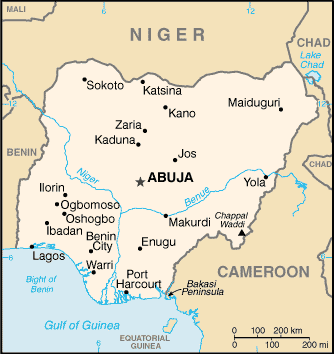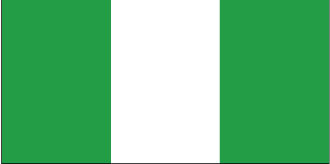
|
Nigeria
Background:
Following nearly 16 years of military rule, a new constitution was adopted in
1999, and a peaceful transition to civilian government was completed. The
president faces the daunting task of rebuilding a petroleum-based economy,
whose revenues have been squandered through corruption and mismanagement, and
institutionalizing democracy. In addition, the Obasanjo administration must
defuse longstanding ethnic and religious tensions, if it is to build a sound
foundation for economic growth and political stability. Despite some
irregularities the April 2003 elections marked the first civilian transfer of
power in Nigeria's history.
Location:
Location: Western Africa, bordering the Gulf of Guinea, between Benin and
Cameroon.
Area: Total: 923,768 sq km, water: 13,000 sq km, land: 910,768 sq km.
Area - comparative: Slightly more than twice the size of California.
Land boundaries: Total: 4,047 km, border countries: Benin 773 km, Cameroon
1,690 km, Chad 87 km, Niger 1,497 km.
Coastline: 853 km.
Climate and Terrain:
Climate: Varies; equatorial in south, tropical in center, arid in north.
Terrain: Southern lowlands merge into central hills and plateaus; mountains in
southeast, plains in north.
People:
Population: 133,881,703.
Ethnic groups: Nigeria, which is Africa's most populous country, is composed of
more than 250 ethnic groups; the following are the most populous and
politically influential: Hausa and Fulani 29%, Yoruba 21%, Igbo (Ibo) 18%, Ijaw
10%, Kanuri 4%, Ibibio 3.5%, Tiv 2.5%.
Religions: Muslim 50%, Christian 40%, indigenous beliefs 10%.
Languages: English (official), Hausa, Yoruba, Igbo (Ibo), Fulani.
Government:
Government type: Republic transitioning from military to civilian rule.
Capital: Abuja; note - on 12 December 1991 the capital was officially
transferred from Lagos to Abuja.
Independence: 1 October 1960 (from UK).
Economy overview:
The oil-rich Nigerian economy, long hobbled by political instability,
corruption, and poor macroeconomic management, is undergoing substantial reform
under the new civilian administration. Nigeria's former military rulers failed
to diversify the economy away from overdependence on the capital-intensive oil
sector, which provides 20% of GDP, 95% of foreign exchange earnings, and about
65% of budgetary revenues. The largely subsistence agricultural sector has
failed to keep up with rapid population growth, and Nigeria, once a large net
exporter of food, now must import food.
Statistics:
Telephones - main lines in use: 500,000.
Telephones - mobile cellular: 200,000.
Radio broadcast stations: AM 83, FM 36, shortwave 11.
Radios: 23.5 million.
Television broadcast stations: 3.
Televisions: 6.9 million.
Internet users: 100,000.
Railways: Total: 3,557 km.
Highways: Total: 194,394 km, paved: 60,068 km, unpaved: 134,326 km.
Airports - with paved runways: 36, with unpaved runways: 34.
Heliports: 1.
Return to Visiting Locations
|

